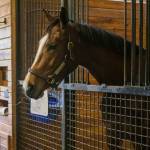Abdominal Surgery in Horses: Obesity Complicates Healing

Obesity complicates the recuperation of horses that undergo abdominal surgery, according to recent research.1
In humans, obesity has been associated with increased surgical morbidity and mortality following abdominal surgery. To determine if this same thesis holds true for horses, researchers looked at records from nearly 300 horses undergoing celiotomy to ascertain if those with increased body fat, as estimated by body mass index (BMI), were more likely to develop postoperative complications, particularly incisional problems.
In layman’s terms, a celiotomy is any abdominal surgery. Generally performed as a life-saving measure to correct gastrointestinal disease, namely colic, celiotomy in horses may also be used to address reproductive-tract issues or diseases of other abdominal organs. A longitudinal incision is typically made on the ventral midline starting near the umbilical scar. Once the abdomen is opened, various gastrointestinal procedures can be performed, including resituating displaced intestine, resection of necrotic tissue, or removal of obstructions.
In one study published in 1995, of 274 horses that underwent celiotomy, 30% had incision-related complications, the most common of which were peri-incisional edema, drainage, incisional abscess, suture sinus (tracts around a suture that seep serous or purulent material), and dehiscence (separation of wound edges). No mention of body condition was noted in this study, however.2
In the more recent study, the records of 287 horses were reviewed, complete with BMI data, and 24% of horses had incisional complications. According to the researchers, “horses with incisional complications had a higher BMI compared with those without,” indicating obese horses might struggle more with wound healing following colic surgery than those in more moderate body condition.
“The pervasiveness of obesity in the global horse population cannot be contested, as multiple studies and surveys have come to the same conclusion,” said Catherine Whitehouse, M.S., a nutrition advisor at Kentucky Equine Research.
“This study underscores the importance of keeping horses at a moderate body condition. No horse owner wants to think about a horse undergoing surgery, but it’s best to give the horse every chance to have a complication-free recovery.”
Horses recovering from celiotomy must often follow strict nutritional guidelines, and refeeding directives are sometimes based on the procedure performed. When allowed, horses can be supported with anti-inflammatory products as well as digestive supplements.
1Hill, J.A., J.F. Tyma, G.M. Hayes, R. Radcliffe, and S.L. Fubini. 2020. Higher body mass index may increase the risk of incisional complications in horses following emergency ventral midline celiotomy. Equine Veterinary Journal 52(6):799-804.
2Wilson, D.A., G.J. Baker, and M.J. Boero. 1995. Complications of celiotomy incisions in horses. Veterinary Surgery 24:506-514.








